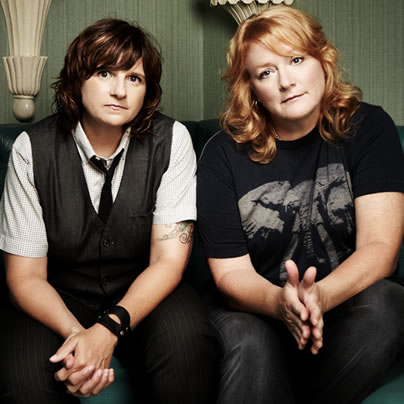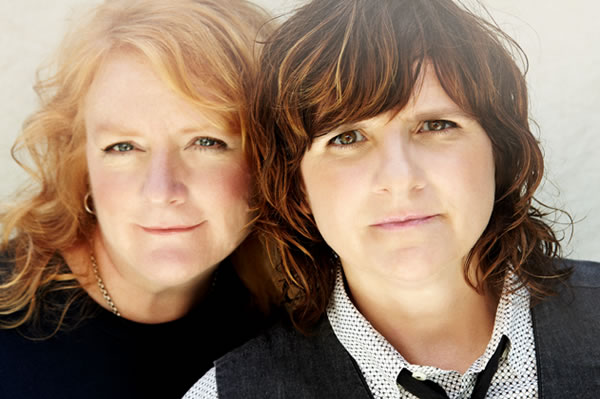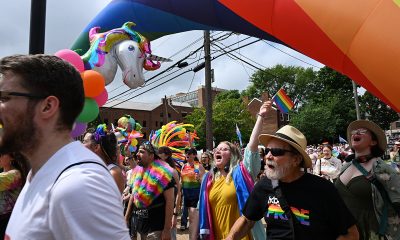Arts & Entertainment
Staying in tune
Emily Saliers on the economics of recording circa 2013, caring for guitars on the road and more


The Indigo Girls are Amy Ray, left, Emily Saliers. (Photo by Jeremy Cowart; courtesy Propeller Publicity)
Indigo Girls/Joan Baez concert
Wolf Trap
1551 Trap Road
Vienna, VA
Wednesday
8 p.m.
$28-$42
wolftrap.org
indigogirls.com
It’s easy to take the Indigo Girls for granted. They keep the albums coming every couple years, play the D.C. region often and despite their insistence on keeping things fresh, still manage to feel — and sound — like sonic comfort food.
From her home in Atlanta on the eve of embarking on a 10-date mini-tour with Joan Baez (sandwiched between a slew of other dates), Emily Saliers took a few minutes with us and was as unpretentious and down-to-earth as she’s always been. They play Wolf Trap Wednesday night. Her comments have been slightly edited for length.
BLADE: Why Joan, why now?
SALIERS: Our manager knows Joan’s and we’ve been friends for about 10 years and have toured with her before. The timing was just right and Joan was wanting to do it.
BLADE: Full band?
SALIERS: Yeah, we’re bringing the Shadowboxers with us. They’re a great group of young guys and an up-and-coming band. Usually they open for us but since this will be a full show with two sets, they’re the house band. We call Joan our matriarch and then these guys are younger so I really like the intergenerational aspects of the tour.
BLADE: Will you be collaborating with Joan on anything or is it separate sets?
SALIERS: We’ll do ours first, then Joan, then we’ll do a handful of songs together.
BLADE: Picked the songs yet for the collaborations?
SALIERS: We know we’ll do “Don’t Think Twice It’s All Right” but the others are still in the works. We might do a couple Indigo Girls songs and a couple of Joan’s. There’ll be others we might do some nights and others on other nights.
BLADE: For some musical acts — perhaps even most — the general public tends to heavily identify the band or singer with the era in which it had its biggest commercial success. This would be true of both Joan Baez and Indigo Girls. Yet fans know there’s usually so much more to an artist than one era. Does this bother you?
SALIERS: I know that kind of typecasting musically exists. It doesn’t really bother me although I wish people would be a little more broad minded when it comes to such things. We continue to put out new records every couple of years and we’ve had our fingers all over the board in all kinds of genres. I think our discography proves we’re still viable and relevant. For a long time we were just the lesbian band or people just thought of the skits on “Saturday Night Live.” But Amy and I would be so bored if that’s all we were and we feel we’ve done our very best work since then. It’s the same thing in many ways with Joan. She was and still is a tremendous activist and it just goes on and on and on. She’s been very brave and courageous in dangerous times and she’s been true to her vision of social justice. It’s not just old stuff from the ‘70s. She’s that kind of person to us and hopefully we can inspire people the same way.
BLADE: So many acts now are just touring on their catalog or might do an EP here or there yet the Indigo Girls, like you said, have kept up with adding to your discography. Has there been any sense that they’ve yielded diminishing returns in some ways or are they creatively satisfying enough for you to have kept at it?
SALIERS: We really don’t make any money selling records, I’ll tell you that. Those days are long, long gone. But I get so fucking excited when an artist I love has a new album out so we try to think of the fans and approach it that way. It’s important for the fans and also for our own musical growth. And yes, we have to think economically, which is a total bummer. There were some glory days when we didn’t have to. It does suck sometimes. Like just recently we were going to do a symphonic record and right in the middle of planning it, the union law changed for the musicians and the studio scale just took it totally out of our league. It’s a shame because we were dying to make that record, but of course we’re also not going to go in the hole for tens of thousands of dollars to do it. It’s just a very different landscape than we came up in so we make a lot of tactful decisions based on economics while also honoring our belief that we have to keep making new music.
BLADE: You play D.C. regularly. How are audiences here different from other comparable-size regions?
SALIERS: D.C. audiences are really distinctive. Like Florida in the sense that, well, it’s just so different from anyplace else. Just kind of this strange, exotic place. D.C. has been very loyal to us and we love playing Wolf Trap which in some ways I can’t believe we can still play it because it’s one of the larger venues but we always do well there and we have such a great time. With many amphitheaters the spacial difference can really sop up a lot of the energy but that doesn’t happen at Wolf Trap.
BLADE: There are many, many lesbian singer/songwriter-type musicians who have and have had loyal followings in certain circles but never cracked the mainstream zeitgeist in any way. How do you think you and Amy managed to do that?
SALIERS: I think a lot of it was really just timing. We were signed in the era when you had people like Tracy Chapman and Melissa Etheridge and Jewel and Suzanne Vega and a slew of women with acoustic guitars selling a bunch of records. We got signed at that time and radio was friendly to us then. REM gave us a leg of their tour which really helped with visibility. If we came out now, we’d just totally be swimming upstream to maintain successful long careers. I also think because Amy’s music is different from mine, there’s kind of two musical lives playing out here, people don’t get bored by it. We don’t just think of it as music with acoustic guitars. I mean Amy rocks hard. But the reality is it’s a male-dominated business and most women artists have to sell their sexuality to be successful. For men it’s true to a degree but not the same extent. Rock and roll is a male genre and that’s really its power structure.
BLADE: How many guitars do you travel with?
SALIERS: We have these massive guitar coffins, they’re called, these travel cases where a bunch can fit in rather than having to line them all up individually. Let’s see, probably about 15-20 including banjo, mandolin and classical guitar, which we use for a few songs.
BLADE: Some folks — perhaps the less musically inclined — have asked if it’s really necessary to keep changing guitars every song. Is it because different tunings are used for different songs, overall sonic variety or what? I’m sure you have a guitar tech, right?
SALIERS: It’s all those things, yes. It may seem a bit absurd but trust me, if we didn’t do that or have a guitar tech, which is a very necessary luxury. Our guitar tech Sully has been with us 17 years and really is part of the fabric of the Indigo Girls. But yes, we’d spend half our set just tuning if we didn’t have her. It really contributes a lot to show flow. It really disrupts the flow of things if you have to stand there and keep tuning. So part of it is keeping things interesting for the audience, too. Doing some on mandolin or some on banjo varies it up. If it were all the same sonically it would be very boring.
BLADE: Did you have to learn good pitch, both with the guitar and vocally, or did that always just come natural for you? Are there ever times where you go back and think, “Yikes, we went a little flat there.”
SALIERS: Oh yeah, it happens all the time but I grew up in a very musical family and singing in choirs so we were taught to be very mindful of pitch and learned all the little tricks you can do to stay on pitch. I have a good ear and can always tell if something’s a little flat or sharp. I’m very mindful of that, especially on records. In fact, that’s one way Amy and I differ a little. Her feeling would be if a take catches the vibe but is a little pitchy, she’d be more inclined to go with it. I have a little different approach. If the pitch is off, I just can’t live with it.
BLADE: How long of a set do you have planned for next week?
SALIERS: Probably an hour to and hour-15 then about four songs with Joan.
BLADE: Thanks for your time!
SALIERS: Thanks, take care.
Photos
PHOTOS: Montgomery County Pride in the Plaza
LGBTQ celebration held in downtown Silver Spring

Montgomery County Pride in the Plaza was held on Sunday, June 29 at Veterans Plaza in Silver Spring, Md.
(Washington Blade photos by Michael Key)























The fifth annual Fredericksburg Pride march and festival was held on Saturday, June 28. A march through the streets of downtown Fredericksburg, Va. was followed by a festival at Riverfront Park.
(Washington Blade photos by Michael Key)



















India
Anaya Bangar challenges ban on trans women in female cricket teams
Former Indian cricketer Sanjay Bangar’s daughter has received support

Anaya Bangar, the daughter of former Indian cricketer Sanjay Bangar, has partnered with the Manchester Metropolitan University Institute of Sport in the U.K. to assess her physiological profile following her gender-affirming surgery and undergoing hormone replacement therapy.
From January to March 2025, the 23-year-old underwent an eight-week research project that measured her glucose levels, oxygen uptake, muscle mass, strength, and endurance after extensive training.
The results, shared via Instagram, revealed her metrics align with those of cisgender female athletes, positioning her as eligible for women’s cricket under current scientific standards. Bangar’s findings challenge the International Cricket Council’s 2023 ban on transgender athletes in women’s cricket, prompting her to call for a science-based dialogue with the Board of Control for Cricket in India and the ICC to reform policies for transgender inclusion.
“I am talking with scientific evidence in my hand,” Bangar said in an interview posted to her Instagram page. “So, I hope, this makes an impact and I will be hoping to BCCI and ICC talking with me and discussing this further.”
On Nov. 21, 2023, the ICC enacted a controversial policy barring trans women from international women’s cricket. Finalized after a board meeting in Ahmedabad, India, the regulation prohibits any trans player who has experienced male puberty from competing, irrespective of gender-affirming surgery or hormone therapy. Developed through a 9-month consultation led by the ICC’s Medical Advisory Committee, the rule aims to safeguard the “integrity, safety, and fairness” of women’s cricket but has drawn criticism for excluding athletes like Canada’s Danielle McGahey, the first trans woman to play internationally. The policy, which allows domestic boards to set their own rules, is slated for review by November 2025.
Bangar shared a document on social media verifying her participation in a physiological study at the Manchester Metropolitan University Institute of Sport, conducted from Jan. 20 to March 3, 2025, focused on cricket performance. The report confirmed that her vital metrics — including haemoglobin, blood glucose, peak power, and mean power — aligned with those of cisgender female athletes. Initially, her fasting blood glucose measured 6.1 mmol/L, slightly above the typical non-diabetic range of 4.0–5.9 mmol/L, but subsequent tests showed it normalized, reinforcing the study’s findings that her physical profile meets female athletic standards.
“I am submitting this to the BCCI and ICC, with full transparency and hope,” said Bangar. “My only intention is to start a conversation based on facts not fear. To build space, not divide it.”
In a letter to the BCCI and the ICC, Bangar emphasized her test results from the Manchester Metropolitan University study. She explained that the research aimed to assess how hormone therapy had influenced her strength, stamina, haemoglobin, glucose levels, and overall performance, benchmarked directly against cisgender female athletic standards.
Bangar’s letter to the BCCI and the ICC clarified the Manchester study was not intended as a political statement but as a catalyst for a science-driven dialogue on fairness and inclusion in cricket. She emphasized the importance of prioritizing empirical data over assumptions to shape equitable policies for trans athletes in the sport.
Bangar urged the BCCI, the world’s most influential cricket authority, to initiate a formal dialogue on trans women’s inclusion in women’s cricket, rooted in medical science, performance metrics, and ethical fairness. She called for the exploration of eligibility pathways based on sport-specific criteria, such as haemoglobin thresholds, testosterone suppression timelines, and standardized performance testing. Additionally, she advocated for collaboration with experts, athletes, and legal advisors to develop policies that balance inclusivity with competitive integrity.
“I am releasing my report and story publicly not for sympathy, but for truth. Because inclusion does not mean ignoring fairness, it means measuring it, transparently and responsibly,” said Bangar in a letter to the BCCI. “I would deeply appreciate the opportunity to meet with you or a representative of the BCCI or ICC to present my findings, discuss possible policy pathways, and work towards a future where every athlete is evaluated based on real data, not outdated perceptions.”
Before her transition, Bangar competed for Islam Gymkhana in Mumbai and Hinckley Cricket Club in the U.K., showcasing her talent in domestic cricket circuits. Her father, Sanjay Bangar, was a dependable all-rounder for the Indian national cricket team from 2001 to 2004, playing 12 test matches and 15 One Day Internationals. He later served as a batting coach for the Indian team from 2014 to 2019, contributing to its strategic development.
Cricket in India is a cultural phenomenon, commanding a fanbase of more than 1 billion, with more than 80 percent of global cricket viewership originating from the country.
The International Cricket Council, the sport’s governing body, oversees 12 full member nations and more than 90 associate members, with the U.S. recently gaining associate member status in 2019 and co-hosting the 2024 ICC Men’s T20 World Cup. The BCCI generated approximately $2.25 billion in revenue in the 2023–24 financial year, primarily from the Indian Premier League, bilateral series, and ICC revenue sharing. The ICC earns over $3 billion from media rights in India alone for the 2024–27 cycle, contributing nearly 90 percent of its global media rights revenue, with the BCCI receiving 38.5 percent of the ICC’s annual earnings, approximately $231 million per year.
Women’s cricket in India enjoys a growing fanbase, with over 300 million viewers for the Women’s Premier League in 2024, making it a significant driver of the sport’s global popularity. The International Cricket Council oversees women’s cricket in 12 full member nations and over 90 associate members, with the U.S. fielding a women’s team since gaining associate status in 2019 and competing in ICC events like the 2024 Women’s T20 World Cup qualifiers. The BCCI invests heavily in women’s cricket, allocating approximately $60 million annually to the WPL and domestic programs in 2024–25, while contributing to the ICC’s $20 million budget for women’s cricket development globally. India’s media market for women’s cricket, including WPL broadcasting rights, generated $120 million in 2024, accounting for over 50 percent of the ICC’s women’s cricket media revenue.
“As a woman, I feel when someone says that they are women, then they are, be trans or cis. A trans woman is definitely the same as a cis woman emotionally and in vitals, and specially, when someone is on hormone replacement therapy. Stopping Anaya Bangar from playing is discrimination and violation of her rights. It is really sad and painful that every transwoman need to fight and prove their identity everywhere,” said Indrani Chakraborty, an LGBTQ rights activist and a mother of a trans woman. “If ICC and BCCI is stopping her from playing for being transgender, then I will say this to be their lack of awareness and of course the social mindsets which deny acceptance.”
Chakraborty told the Blade that Bangar is an asset, no matter what. She said that the women’s cricket team will only benefit by participation, but the discriminating policies are the hindrance.
“Actually the transgender community face such discrimination in every sphere. In spite of being potent, they face rejection. This is highly inhuman. These attitudes is regressive and will never let to prosper. Are we really in 2025?,” said Chakraborty. “We, our mindset and the society are the issues. We, as a whole, need to get aware and have to come together for getting justice for Anaya. If today, we remain silent, the entire community will be oppressed. Proper knowledge of gender issues need to be understood.”
The BCCI and the International Cricket Council have not responded to the Blade’s repeated requests for comment.
-

 U.S. Supreme Court4 days ago
U.S. Supreme Court4 days agoSupreme Court upholds ACA rule that makes PrEP, other preventative care free
-

 U.S. Supreme Court4 days ago
U.S. Supreme Court4 days agoSupreme Court rules parents must have option to opt children out of LGBTQ-specific lessons
-

 Television4 days ago
Television4 days ago‘White Lotus,’ ‘Severance,’ ‘Andor’ lead Dorian TV Awards noms
-

 Music & Concerts4 days ago
Music & Concerts4 days agoBerkshire Choral to commemorate Matthew Shepard’s life











